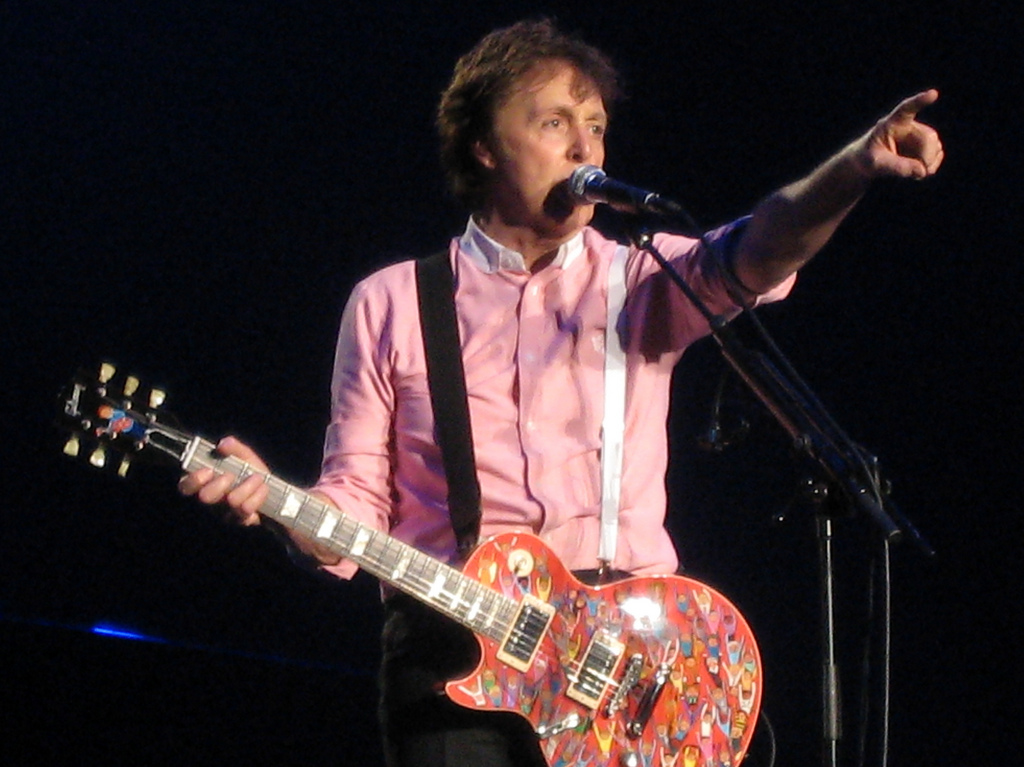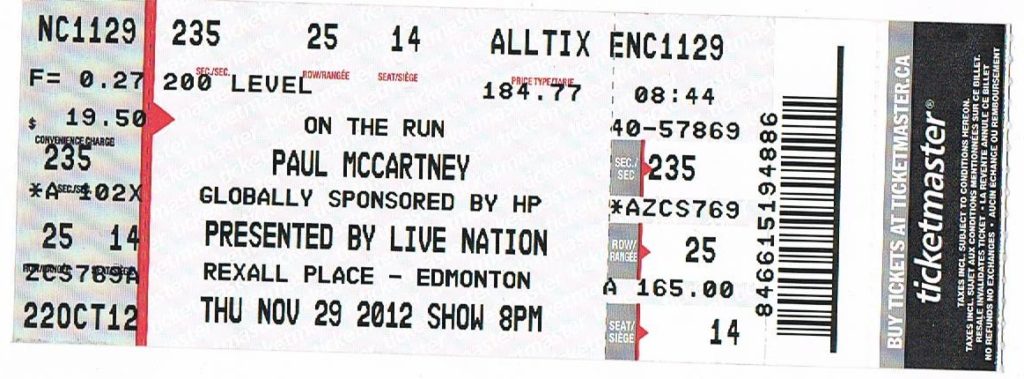
A New York Times interview of Paul McCartney by reporter Caryn Ganz showcases one of the world’s iconic rock stars who is still totally on his game. Ganz talked to Sir Paul after a recent New Jersey concert. Not only does it profile a performer who totally understands his mission, but if you carefully read his responses, it’s a clinic for program directors about respecting the audience.
McCartney addresses the balancing act of appealing to both fanatics and casual fans, putting yourself in your fans’ shoes, and the role of new music and deep tracks versus proven gold. Below are some of the key questions, followed by segments of Paul’s responses. And my color commentary is in italics.
Caryn Ganz: At your MetLife concert, there was a fan sitting in front who has seen you over 100 times. How do you please both him and a 20 year-old seeing you for the first time?
Paul McCartney: What I really do for both of them is try to do a show that I would like to go and see. So I first of all sit down and think, if I was going to see him, I want him to do this, and he couldn’t leave out that, and I really hope he’ll do this. So those songs are the starting point. And then we start to kick things around in rehearsal, and my band will sometimes suggest an idea, or I’ll hear something on the radio and think, we should do that.
Me: So in essence, he’s building his show like a great PD designs a station. Of course, you have to satisfy those Super P1s who give you the most quarter-hours, but you also have to make sure the occasional concert-goer – or cumer – can appreciate the show as well. When Paul talks about those core songs that he simply has to play, essentially those are his “powers,'” and he locks them in. I wouldn’t at all be surprised if they actually have some separation in his set list to be sure they hook the crowd in at just the right times. In this way, he moves the audience from a smash hit to a an album track or secondary song – and back to power. And the collaboration with his team is an essential element, too. Lastly, you know Paul would be a smart consultant, because he combines multiple sources of input, including listening to which Beatles, Wings, and his solo songs are playing on the radio today.
CG: Bob Dylan is also on tour now, playing almost exclusively new songs. Can you imagine doing that?
PM: I’ve thought about that a lot. Theoretically, the philosophy is good, because, well, you’re not playing songs you’ve played a lot. But my concern is for the audience. I remember when I went to concerts, particularly as a kid, it was a lot of money you had to save up.
So I imagine myself going to my show: Would I like to hear him play all new songs? No. I wouldn’t want to do that. I would do a smaller gig and advertise the fact up front – I’d probably call the tour “Deep Cuts” or something , so you knew it was going to just really deep cuts that only the aficionados would know. I think if I did that, it would be quite fun.
Me: Some great advice here – first and foremost, think about the content from the audience’s point of view. What are they thinking and expecting, and how can programming best match up with their expectations? His comment about depth tracks or new music speaks to some of the same dilemmas many programmers face. Paul’s suggestion: let the deep stuff play in a weekend specialty show where you can glean aesthetic credit during a less critical daypart. And lastly, not an unkind word toward a fellow icon, even if he may patently disagree with Dylan’s tour design.
 CG: It’s interesting how much you think about the audience being entertained or disappointed.
CG: It’s interesting how much you think about the audience being entertained or disappointed.
PM: Having been one, and having spent what for me was a lot of money. And that was very much the Beatles’ philosophy. If you think about our singles, there was an A and a B side. Normally people put a bit of rubbish on the B side, but the Beatles B sides are really always good. We used to call it “value for money.” Because we had all recently been those teenagers that we were now appealing to.”
Me: Paul’s wisdom is spot-on here, because every moment, every impression counts. People don’t just form opinions about your station from your morning show or your veteran midday talent. What happens at night, on weekends, and during the so-called “off times” all contribute to the overall brand image and building that sense of loyalty. When someone tunes in your radio station, they giving you the gift of their time. It has value, and that’s something Paul instinctively understands.
It’s also important to retain those fan feelings. Many radio people haven’t paid for a concert ticket in years, and may not even be aware of just how much they cost. A sense of empathy for fans is a critical piece that goes into being a great PD. Programming a station from the point of view of the listener – providing a great UX or User Experience – is what separates the good brand managers from the great ones.
CG: In times of chaos, fans gravitate to the comfort and perspective of a song like “Let It Be.” Have the feelings you experience while playing it changed over the years?
PM: You know, strangely it hasn’t changed that much. I always expect to reach a point where I’m really jaded, and I’ll think, Oh, not again! But as I start it up, I’m reviewing this young guy’s work. And maybe a line or a phrase will strike me, and I’ll think, the kid was good!
Me: The classics are…the classics. And the reason they endure is that they’re simply great songs. Like the emotional benefits that radio brings to its audience, those iconic Beatles songs create feelings and experiences in much the same way an on-air personality provides companionship on the drive to work, or mood elevation when a listener truly needs it. Understanding how those emotional connections are made is part of what makes a great concert – and a great radio station.
Paul McCartney may not think of himself as a programmer per se, but his intrinsic understanding of the craft of entertaining millions of fans and followers is one of the reasons why he’s endured. He unknowingly just gave all radio programmers a gift – the point of view from someone who truly gets what it means to connect and entertain.
You can read the entire interview here.
- Why “Dance With Those Who Brung You” Should Be Radio’s Operating Philosophy In 2025 - April 29, 2025
- The Exponential Value of Nurturing Radio Superfans - April 28, 2025
- What To Do If Your Radio Station Goes Through A Midlife Crisis - April 25, 2025




Great interpretation! Nice piece, Fred! A reminder that it’s truly a balance of art, science, and listener point-of-view.
Thanks, Bob. As I read the interview in the Times, it just sounded so much like a wise man giving great radio advice. Appreciate the comment.
Listener POV is key. It is something we can lose sight of, but we need to hold on to that no matter how much gets in the way. Thanks!
Exactly, Chris, and it’s remarkably cool just how much Sir Paul thinks about that even though the last time he paid for a concert ticket was probably six decades ago!
Excellent point of view, Fred. I know some old, disgruntled radio jocks who have never been PD’s (and a few wannabees) who should read this, too.
Yes, there is room for those B-sides and deeper tracks. But it’s not supposed to be, nor ever should be the “meat” of a station’s programming…despite what some people on a particular Facebook page I read say. You need to think of the audience as a whole and program accordingly.
Great comments, Kevin. Thanks for contributing.
I admire Paul is so many ways. Not only is he smart and strategic, still thinking about people struggling to buy a ticket, but he’s in great shape, moves around the stage like a 20 year old, doesn’t use backup singers to cover his voice and (unlike many classic rock artists who still release new material – IMO of course) his newer stuff is really good.
He doesn’t need the money and as the excesses of a life of partying like a rock star are taking their toll on so many great well, rock stars, McCartney is a living example of how to stay vibrant and relevant by being, well, vibrant and relevant.
Cheers to Paul!!!
Bob, you’re correct. Paul has set a great example for his peers – and all of us. He also exudes innovation in embracing bands like the Foo Fighters as well as technology like virtual reality. For those reasons, he is a great “consultant.”
Awesome post today, Fred! Last time I saw Paul at Fenway, I thought the SAME thing!! He caters to Everyone…and another thing I picked-up on in that interview–Paul LISTENS to everyone, including his bandmates(who, by the way, he’s been with longer than when he was w/The Beatles).
A smart programmer uses science, art, gut, AND others opinions, too!
Yup, that ability to listen is key to maintaining a successful career no matter what stage you’re in. Thanks for the comment.